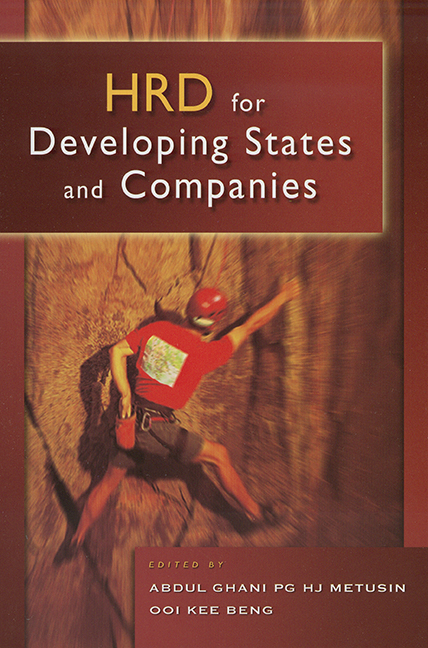Book contents
- Frontmatter
- Contents
- Foreword
- Preface
- Editorial Remarks
- Acknowledgements
- Introduction
- HRD for Statesmen
- 1 Human Resource Development in Developing Countries
- 2 Building the New HR Base — The Brunei Perspective
- 3 Managing and Achieving Excellence through HR Key Performance
- 4 Achieving an Integrated, Informed and Innovative Government for the Twenty-first Century — A Model for Emerging Markets
- 5 Human Resource Development — Challenges for the Public Services
- 6 Human-focused Management for Future Progress
- HRD Strategies for Companies
- Competence Development
- Corporate Experiences
- About the Authors
1 - Human Resource Development in Developing Countries
from HRD for Statesmen
Published online by Cambridge University Press: 21 October 2015
- Frontmatter
- Contents
- Foreword
- Preface
- Editorial Remarks
- Acknowledgements
- Introduction
- HRD for Statesmen
- 1 Human Resource Development in Developing Countries
- 2 Building the New HR Base — The Brunei Perspective
- 3 Managing and Achieving Excellence through HR Key Performance
- 4 Achieving an Integrated, Informed and Innovative Government for the Twenty-first Century — A Model for Emerging Markets
- 5 Human Resource Development — Challenges for the Public Services
- 6 Human-focused Management for Future Progress
- HRD Strategies for Companies
- Competence Development
- Corporate Experiences
- About the Authors
Summary
The story of human civilization is the story of human resource development. The societies that were able to develop and progress were the societies that succeeded in developing and harnessing human resources.
Those unable to develop human resources remained backward and oftentimes became dominated by those with developed human resources.
Initially the stress was on brawn, the brute strength that enables hard laborious work to be done. Intelligence was not at a premium. Moving huge boulders to build the pyramids in the end depended on large numbers of well-built workers. On their own, the workers would not have been able to accomplish what they did, but the supervisors and the engineers applied the brute strength of the workers to achieve the wonders that we still see today.
The societies that developed themselves based on human resources became stratified with manual workers at the bottom and the others above, graded according to their level of skill and intelligence. Those able to manage human resources would attain the highest level. In themselves, they constituted the highest level of human resource.
In many societies, the stratification became institutionalized and embedded in the culture. It became even a part of their beliefs and religions. This is what we have to this day.
In most societies, a very complex system of castes based on the specialization of labour and occupation tends to make an appearance. Once this happens, the upward mobility of the lower castes is hindered. Much potential is lost.
But in some societies, the stratification is not very rigid and it is possible for skills to be developed by the lower caste to the extent that upward mobility is attained. The more upwardly mobile the human resources, the greater will the availability of developed human resources be.
Today, outwardly at least, we do not believe in castes or stratification. Members of any stratum can move up or down as they are able, and society benefits because the potential of all can be exploited to the maximum. It is this realization that has made human resource development an important matter for any society wishing to progress.
- Type
- Chapter
- Information
- HRD for Developing States & Companies , pp. 3 - 9Publisher: ISEAS–Yusof Ishak InstitutePrint publication year: 2005



